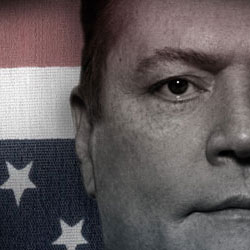Kiss Your Privacy Goodbye
THE FOURTH AMENDMENT IS BEING RIPPED TO SHREDS BY WALL STREET MERGERS, UNCLE SAM’S WAR ON TERROR AND THE HIGHEST COURT IN THE LAND.
by Robert Scheer
Ever read the Fourth Amendment to the U.S. Constitution? Probably not, or you—like most Americans—would not be so accepting of its demise as a pillar of the freedoms guaranteed to us by the Bill of Rights. The Fourth is the one that guarantees “The right of the people to be secure in their persons, houses, papers, and effects, against unreasonable searches and seizures. …”
As the wording of the amendment clearly states, it’s not just your home that is your castle. Dating back to the late 12th century, when English common law was first taking shape, this principle granted a person sovereignty over his space even if a tyrannical monarch was sitting on the throne. The Fourth Amendment goes further than that, extending your sovereignty over “houses, papers, and effects.” So even when you are traveling beyond the confines of your domicile, your fundamental right to a private space is protected.
That space can only be invaded by agents of the state under the Fourth Amendment’s narrowly prescribed parameters: “no warrants shall issue, but upon probable cause, supported by oath or affirmation, and particularly describing the place to be searched, and the persons or things to be seized.”
How much clearer could the framers of our Constitution have made it? They knew exactly the dangers they were describing: agents, acting on behalf of King George III, who would conduct general sweeps through the homes of rebellious colonists as a means of enforcing blind obedience and squelching any rumblings of revolution. Privacy of home and thought was not some perk of leisure to the founders but rather the bedrock on which free citizens could stand.
Better tell that to New York City Mayor Michael Bloomberg, who has defended the increasingly widespread use of drones to spy on every second of our most personal activity. Easy for Bloomberg. As one of the country’s richest men, he can no doubt find heavily guarded sanctuaries to provide him with virtually impenetrable privacy. His advice to the rest of us on his weekly radio show was that privacy is doomed: “You can’t keep the tides from coming in. We’re gonna have more visibility and less privacy. I don’t see how you stop that.”
What a cop-out to liken calculated assaults by state and private snoopers on our most intimate affairs to the natural rise and fall of sea levels dictated by the gravitational pull of the moon and sun along with Earth’s rotation. Snooping is dictated by the eagerness of snoopers, official or private, and their unconstitutional antics can be banned as a matter of law. But that doesn’t seem to be the case.
For example, back in 1999, Congress repealed the Glass-Steagall Act, permitting insurance companies, investment houses and commercial banks to merge. At the time, privacy advocates pointed out that this would permit the consolidation of massive medical and financial databases. They called for a statutory requirement that an individual’s records could not be shared without their express consent. Under pressure from the banking lobbyists eager to exploit this new trove of personal information, Congress rejected that safeguard. What should be confidential is now public.
Unfortunately, in 2001 that assault on our privacy rights was followed by the so-called War on Terror in response to the 9/11 attacks. The pretext of fighting foreign enemies has led to a massive expansion of warrantless surveillance of our phone calls and emails without any of the safeguards enshrined in our Constitution.
Earlier this year the Supreme Court threw out a challenge to this surveillance on the grounds that since it is secret, we citizens have no basis for claiming we are being spied on even though the government concedes it is doing just that.
So much for the Fourth Amendment and your privacy rights.

















